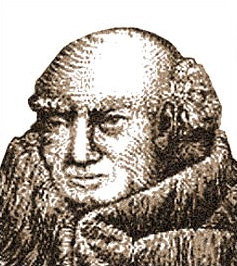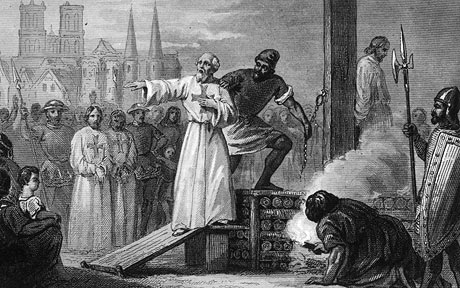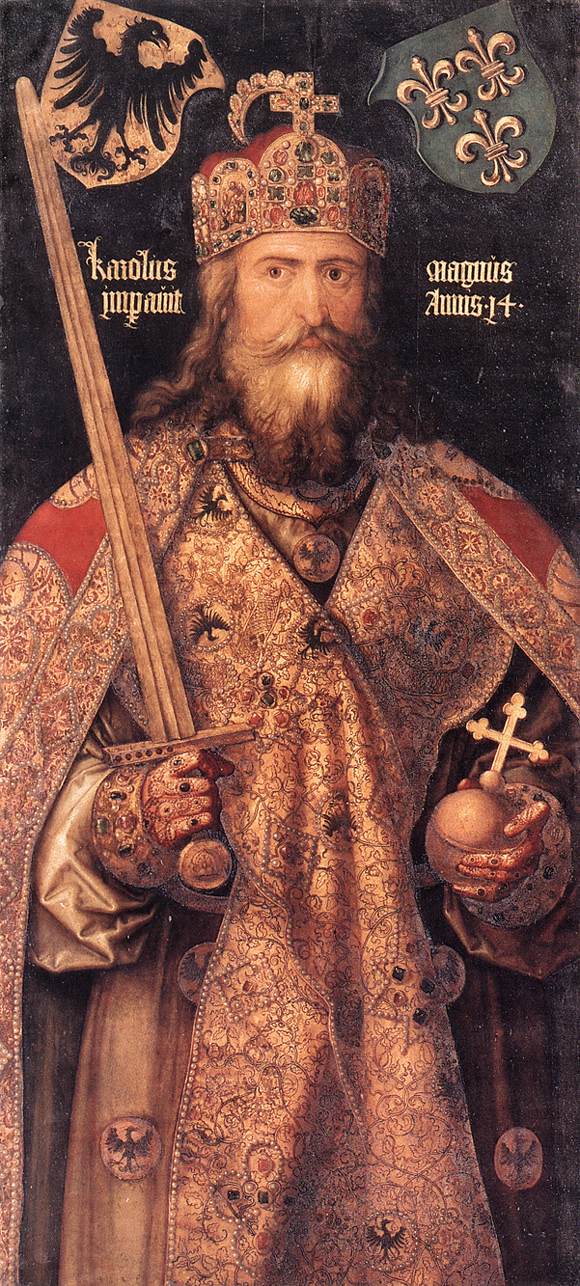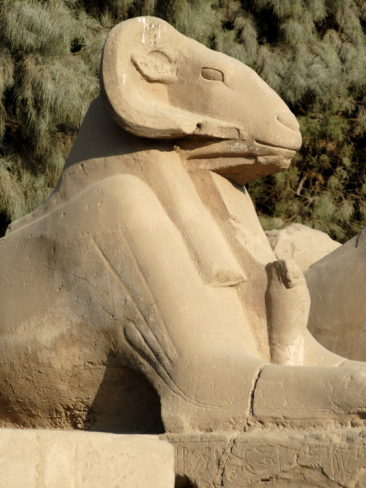
Johannes Scotus Eriugena was among the first to propose that God became the Universe, and did so to learn something about itself. (Photo credit: Wikipedia)
(NOTE: This article will be Part II of an series of articles I AM creating on my ancestor Saint Bede who I had written Part I titled, Saint Bede’s Real Name Part 1 – Introduction to the Facts.)
Perfect love means perfect harmony. Various are the strings on a harp yet they constitute one harp. “Love is a tie or bond through which all things are united in ineffable friendship and insoluble unity,” – Saint John Scotus Erigena.
Life of Johannes Scotus Eriugena:
Regarded as Europe’s greatest philosopher of the early Middle Ages, Johannes Scottus Eriugena, was an Irishman. Eriugena was highly proficient in Greek, which, though rare at that time in West Europe, was used in the learning tradition of Early and Medieval Ireland, as evidenced by the use of Greek script in medieval Irish manuscripts. Thus, with an Irish education, he was well equipped for Western society, and his linguistic competences allowed for intellectual exchanges. He moved to France (about 845) and took over the Palatine Academy at the invitation of Carolingian King Charles the Bald.
For being such a famous Scottish theologian, philosopher and poet who was also the Grand Preceptor to one of the greatest French Kings ever, it is quite a surprise that little to nothing is known about the true history of a man named Johannes Scotus Eriugena or John Scotus. It reminds me of my ancestor Saint Bede whose conspiracy I had also written about a few months ago whose teachings, books authored and life story appear to exactly match the story of this most famous Scottish philosopher named John Scotus who like Bede, was also the Grand Preceptor to the King of the Franks, Charlemagne.
The facts are that there are so many coincidences, that this is really no coincidence at all and nothing short of an ancient religious conspiracy. A conspiracy that Europe’s greatest philosopher of the early Middle Ages, John Scotus (who was actually born in Scotland) and the Father of English History and Doctor of the Catholic Church, Saint Bede are in fact the same person. A man whose blood, race, nationality, teachings and rites that have been detested by Rome and contested by the Templars for the last 1300 years. This would also be the same “John” who we also know of today in the New Testament as John of Patmos or Saint John the Divine who wrote the Apocalypse of St John (Revelations of St John). In addition, to the above connections tying Bede and Scotus together as the same person, they both had miraculously wrote a Commentary on the Gospel of John.
The stunning revelations do not stop here. John Scotus (AKA Bede & Saint John the Divine) may also be the figure head behind the story of the murdered “allegorical” grand master honored by Freemasons known to the world as, Hiram Abiff. Just like the Masonic legend of Hiram, John Scotus was also murdered by his students who had attempted to unsuccessfully steal their master’s secrets. However, instead of murdering him with Mason Tools like that of the Hiram Abiff legend, they had murdered the Grand Master John Scotus with their pens. Manly P. Hall calls the Grand Master of the Dionysiac Architects, CHiram Abiff, a Widow’s Son and guess what, this same John Scotus had worked on a Latin translation of Dionysius the Areopagite undertaken at the request of Charles the Bald (Charlemagne).
Please keep in mind that the Hiram Abiff murder legend and that of John Scotus being murdered by students using their pens are allegorical stories that are told to initiates to conceal hidden truths and also to symbolize or honor specific events in history. Hence, these allegorically told stories honor the light of truth by not publishing lies and at the same divine time, concealing the beautiful persons, pretty places or golden things from our enemies. An art of war using the pen, mind and creative force to subdue our enemies.
As you can clearly see from the little, but Apocalyptic evidence that I have provided in my first few paragraphs above, that this is either a major Christian coincidence or a major Catholic Church cover up that is unravelling rite before your very eyes. I AM going to go with my intuition and vote for the latter because we all know that the Catholic Church has had a tendency over the last 1300 years to embellish the truth and cover up history for their gain. This is just another incident of this abuse of the truth, but however this time it involves one of the most worthy Saints and figure heads the Universal Church has ever produced since its founding.
This most worthy Saint we know of today in the New Testament as John of Patmos or Saint John the Divine who had wrote the Apocalypse of St John (Revelations of St John). Saint John the Divine would be who we know of as Saint Bede today and during his life he was known by family and friends as John the Scot who was born in Iona, Scotland. Of course the Latins of Rome lead by the Pope were jealous of this man of another race and nationality so they were not too happy to receive teachings and commentary on the bible from a Scottish born man named John who adored the Greeks from whom he descended. The Latins in Rome would simply not have John Scotus or his teachings be circulated simply because of his race and Nationality was different from theirs. His illuminated teachings were a threat to their Latin families and just like the Vatican is very good at doing, they had sought to annihilate John Scotus, destroy his truthful teachings and steal that which they deemed fit of his illuminated writings to further their world domination.
Would the Catholic Church condemn “some” of John Scotus’ teaching and writings?
Yes and yes. It doesn’t take long to figure out that during the life of John Scotus, shortly thereafter and to this very day there has been a cover up by the Catholic Church who it is said that a book on the Eucharist, attributed to Scotus by Berengarius, was condemned in three synods, and committed to the flames as impious and heretical.
Accordingly, when his work appeared, Pope Nicholas wrote a letter to Charles the Bald, in which he complains of the publication of this translation without the usual apostolic sanction—quod juxta morem ecclesiae nobis mitti debet— especially as John the Scot, who translated it, although said to be a man of much learning, was by many persons regarded as not altogether sound in his doctrine—non sapere in quibusdam frequenti rumore dicitur. Therefore the Pope orders Charles either to send the aforesaid John to Rome to give an account of himself, or at lensj not to permit him to remain any longer at Paris as the head of the University—aut certo Parisiis in studio, cujus capital jam olim fuisse perhibetur, morari non sinatis. This letter was written in the third year of Nicholas’s pontificate, either A.d. 861 or 862. We do not know what effect the letter produced, whether the king dismissed Scotus from his high position or not. It is very improbable that he did dismiss him, seeing the way in which Anastasius, himself a Roman, spoke of Scotus twelve yearf later as a holy, learned, and humble man. Most probably by that time they had got better information concerning Scotus in Rome, and found out that he was neither so unsound in doctrine, nor so Photian in his tendencies as his enemies made him out to be. At this time, however, when the Pope wrote to Charles, Scotus took very good care not to go to Rome, where he might have met the fate of Gotteschalk; nor does it appear that Charles dismissed his favourite from the palace, although requested to do so by the Pope himself.
His books committed to the flames as impious and heretical just like countless others was ordered to be burnt by the Catholic Church at the Council of Rome in A.d. 1059
The next discussion in which Scotus is said to have taken part occurred shortly afterwards. It has been stated by many writers that he was the first who denied the doctrine of the Real Presence in the Western Church. Certainly, Berengarius, in the eleventh century, claimed Scotus as his i eacher on the new doctrine which he introduced; and the Sacramentarians regarded him as a great apostle of what they called the truth. A book on the Eucharist, attributed to Scotus by Berengarius, was condemned in three synods, and committed to the flames as impious and heretical and the book just like countless others was ordered to be burnt by the Catholic Church at the Council of Rome in A.d. 1059
The very words, on account of which Berengarius says the book was ordered to be burnt at the Council of Rome in A.d. 1059, namely—”ea quae in altare consecrantur esse figuram, pignus, et signum Corporis et Sanguinis Christi,” and which were used in a heretical sense by Berengarius but not by their author, are found in the Book of Ratramnus, the MS. of which still bears his name in uncial letters of the tenth century.
We learn from the Chronicon of the monk Alberic, but from no other source, that in the year A.d. 1225, Honorius III. sent a Brief to the archbishops and bishops of France, in which he passed a severe judgment on the book of Scotus, entitled “Periphysis,” for so the monk writes it. The Bishop of Paris had informed the Pope that this work was full of heretical depravity, and had been condemned by the Archbishop of Sens and his suffragans, that it was hid in many monasteries, where cloistered and scholastic men, thinking it a great thing to propound new opinions, spent much time in the study of the book. So the Pope ordered it to be carefully sought after, whenever it was found to be solemnly burned, and inflicted excommunication, ipso facto, on those who should knowingly presume to keep it in their possession.
At this time I would like to also point out the fact that John Scotus was the first true author/master of the allegorical Temple of Solomon that had given Freemasons most their teachings of the temple that they carry on to this very day. This can easily be documented by Bede’s book, De Templo or On the Temple. This was the first of its kind and whose teachings under King Charlemagne had also been adhered to by many other Kings and Bishops from the 9th and 10th centuries to our current modern society that we see today. This was simply the first book published of its kind on the Temple of Solomon in the history of the world which can be successfully traced back to and verified as fact to originate with Saint Bede, AKA John Scotus. As I stated above, these are the very same teachings of the Temple of Solomon that Freemasons honor to this very day and please remember what I stated above, just like the Masonic legend of Hiram Abiff, John Scotus was also murdered by his students in a similar manner.
Is Johannes Scotus and Johannes Erigena—the former signifying John the Irishman, and the latter, John the Scotchman really the murdered Hi-Ram honored by Freemasons? Is he the lost key (DNA) they have been looking for?
Simply put, you will not find one real life person in Freemason history that can even come close to the similarities and fit perfectly as the true allegorical Hi-Ram Abiff of Freemasonry such as the real life man we know today in the Catholic world as Saint Bede and in the Secret Society world he helped create, John Scotus or St John the Divine. To keep the facts underlying this conspiracy as simple as humanely possible, for the remainder of this article, I will call this man of many names, John Scotus. But please keep in mind that when I do mention John Scotus, I AM also speaking of Saint Bede, Hiram Abiff, John of Patmos and Saint John the Divine because they are all one and the same person.
It may a shock to some of you that the Father of English History and Doctor of the Catholic Church, Saint Bede is actually Europe’s greatest philosopher of the early Middle Ages who is a Scottish born widow’s son of a long line of Irish High Kings. The first thing we need to realize is that the name of John is actually an allegorical family name that was given to honor him in the tradition of the Johannites who John Scotus. The name John would forever immortalize Bede as the biblical figure that we know of today as John of Patmos or Saint John the Divine who had wrote the Apocalypse of Saint John in the New Testament. This fact I have known via DNA Gnosis for the last couple years. Now I AM doing my best to make sense of what I know internally to the rest of the brotherhood here on low.
Just like the most famous Saint Bede, little to nothing is known of John Scotus’ childhood, family or parents. But they are both honored still to this very day as some of Europe’s greatest thinkers, teachers and authors. These major similarities and true life ancient conspiracies do not stop here. They both wrote very similar books who were strongly influenced by the teachings of Saint Augustine .
Scotus translates from the Greek into Latin the writings of Pseudo-Dionysius.
Almost from his first arrival in France, Scotus had been engaged in translating from the Greek into Latin the writings of Pseudo-Dionysius. In the year A.d. 828 the Greek Emperor, Michael Balbus—the stammerer—had sent, as a present to Louis le Debonaire, a copy in Greek of the writings attributed to Dionysius, the Areopagite. Dionysius, mentioned in the 17th chapter of the Acts of the Apostles, was said to have been at first bishop of Athens, and to have been afterwards sent into France by St. Clement, where he preached the Gospel for many years, and died a martyr’s death. The works attributed to St. Dionysius, although really written by some forger of the end of the fifth or beginning of the sixth century, were at this time regarded as genuine.
Hence, the Greek Emperor’s gift was very highly prized in France, and preserved with the greatest care and veneration as the undoubted work of the apostle of the French people, and especially of Paris, where the great Abbey of St. Denis, for many ages the cemetery of the kings of France, was built in his honour. But these writings in Greek were a sealed fountain to most of the French scholars at the time. Hilduin, a monk of St. Denis, was charged with their custody, and commissioned to translate them, but failed in the attempt. When, however, the exiled Irish scholar came to Paris, the king, to his great joy, soon discovered that he was a perfeot master of the Greek tongue, and asked him to undertake the translation of the writings of the Areopagite.
Scotus gladly undertook the task imposed upon him by his royal patron, and executed it in such a way as to please the man of all others best qualified to pronounce a critical opinion—Anastasius, the Roman Librarian. In a letter written to the king, in A.d. 875, he declares it to be a wonderful thing that a man like Scotus, a barbarian, living at the end of the world—vir ille barbarus in finibus mundi positus—could understand and translate into another tongue the writings of the Areopagite. But the Holy Spirit, he says, was the chief agent who filled him at once with fire and eloquence—qui hunc ardentem et loquentem fecit—and charity was the mistress who taught him for the instruction and edification of many. He adds that his only fault was to translate too literally, and the cause of that was his great humility, which did not permit him to change the exact order and meaning of the words of so great a writer.
In researching John Scotus, you will discover that he was also called Divine just like Saint John the Divine. Please keep in mind that the original writings of the Apocalypse of Saint John in the New Testament have never been found or are simply being hidden in Vatican archives. In fact, there are several historians who have claimed that these specific writings were written well after the other Gospels with many of these same said authors stating that the Apocalypse of Saint John was written approximately around the time it is said that Saint Bede had lived.
What we all need to understand is that in the time of Saint Bede, there was no real unity amongst the various nations, tribes and families around the globe. This was actually a time of brutal wars, mass strife and constant power struggles amongst families where brother fought brother, father fought son and sons killed fathers for the glory to rule as King. One could say that the world was in utter chaos where anarchy had ruled over order. This brotherhood chaos would continue on well after the death of Bede and also result in the reason why his true life history were destroyed by the Catholic Church who had condemned his work by a council at Sens by Honorius III (1225), who described it as “swarming with worms of heretical perversity,” and by Gregory XIII in 1585, is arranged in five books.
This was when the Reformation had started and the cover up of the real Saint John the Divine, Johannes Scotus Eriugena had begun. Let me please also point out that his ancestor who had lived at the time right before the Reformation was Beda, Natalis (Noel), who was principal at the College of Montaign, at Paris, in 1502. This is the very same college that Johannes Scotus (St Bede) had founded under Charlemagne in the 8th or 9th century. Noel Beda was opposed to the Reformation and in opposition to the wish of the king, Francis I, to obtain the sanction of the Sorbonne to the divorce of Henry VIII of England. So far did Beda carry matters, that he was arrested in 1530, condemned to make the amende honorable in the Church of Notre-Dame, and was sent prisoner to Mont Saint Michel, where he died in the following year.
This family incident with Noel Beda, Henry VIII and Gregory XIII in Paris 1585 along with the the Council of Rome in A.d. 1059, and the council at Sens by Honorius III in 1225 had led to the destruction of the family rites of Saint John. After the year 1585, Johannes Scotus’ teachings, rites and true history would become what I would like to call the “Conspiracy of Saint John the Divine.” However, the church would of course forever profit immensely of his good name, writings and ites for centuries until this very day.
What does John Scotus Eriugena mean?
“Eriugena” is perhaps the most suitable surname form as he himself uses it in one manuscript. It means ‘Ireland (Ériu)-born’. ‘Scottus’ in the Middle Ages was the Latin term for “Irish or Gaelic“, so his name translates as “John, the Irish-born Gael.” The spelling ‘Scottus’ has the authority of the early manuscripts until perhaps the 11th century. Occasionally he is also named ‘Scottigena’ (“Scot-born”) in the manuscripts.
Confirmation John Scotus, AKA Saint Bede dies in Scotland:
Hector Boethius says of Bede’s residence at Melros, in Scotland, seems to rest upon no foundation whatever, for, though Bede tells us that St. Cuthbert passed some time in that monastery for purposes of study, yet he nowhere hints at having resided there himself.
A similar notion, however, seems to have been entertained by Dempster, who, in his Historia Eccles. gentis Scotorum,4 has the following passage:
Bedam etsi omnes Anglum faciunt, reperis tamen, eum nee Anglum domo, nec Scotum, sed in Scotia diu vixisse, in Anglia diem supremum obiisse.
Clement and Albinus arrive to the court of Charlemagne:
The court of Charlemagne was crowded with Irish scholars, and a story told by a foreign chronicler of good authority, of the arrival of two distinguished Irishmen in France during the reign of that monarch, is peculiarly characteristic. The names of these two scholars were Clement and Albinus, and they arrived on the coast of France in company with a party of merchants. When they landed they saw crowds of Franks eagerly pressing round the merchants, as each proclaimed or exhibited his wares; and immediately, to draw attention to themselves, Clement and Albinus followed the example, and began to cry aloud, ” Who wants wisdom? Who wants wisdom? Let him come to us, for we have it to sell!” By continually repeating this cry, they soon attracted attention and became an object of curiosity, and an account of their behaviour having been given to Charlemagne, he sent for them to his court, was pleased with their manners and attainments, and placed Clement over a school he had established in France, while he sent Albinus to preside over a similar institution at Pavia. I will not attempt to enumerate the other learned Irishmen who flourished in France during the latter part of the eighth century and the beginning of the ninth, at which latter period Eric bishop oi Auxerre, in a panegyrical letter to the emperor Charles the Bold, speaks of Ireland as “despising the dangers of the sea, to migrate, with almost her whole troop of philosophers, to our coasts.”
At the same time wherein king Alfred built University College in Oxford, he also founded another house called King’s-great-hall, (intimating a lesser hard by,) now included within the compass of Brazen-nose College (The Birth-place of Johannes Scotus.). And hence it is that at this very day it payeth- some chief rent to University College, as the ancient owner thereof. Here he placed Johannes Scotus (highly endeared in this king’s affections) reader therein. On the clearing of whose extraction and opinions a long story doth depend.
This Scotus is called Johannes Scotus Erigena, with addition sometimes of Sophista: so that all may amount to a kind of definition of him as to his individual person. Conceive we Scotus for his genus, which because homonymous in that age,^ (as signifying both Scotland and Ireland,) Erigena is added for his difference, that is, bom (as some will have it) in Ireland, called Erin in their own country language. But Dempster, a Scotch writer,}) who will leave nothing that can be gotten above-ground (yea, will dive and dig into the water and land of others) to the credit of his country, claimeth Scotus as born in Scotland, spelling him Airigena, from Aire, a small place therein. But, beside unanswerable arguments to the contrary, “gena” is a termination seldom added to so restrictive a word, but (as Francigena, Angligena) denoteth generally the nation, not petty place, of a man’s extraction. As for Dempster, his credit runneth low with me, ever
John Scotus murdered like the Freemasonic Hiram Abiff – Miserably murdered by his Scholars;
1 much wonder that this Scotus should be so degraded in his old age from Oxford to Malmesbury; from a professor in an university, to a schoolmaster in a country-town; where pouring learning into his lads, (rather in proportion to the plenty of the fountain, than to the receipt of the vessels,) he was severe to such scholars as were dull in their apprehensions. This so irritated their anger against him, that by an universal conspiracy they dispatched him in the school with their penknives. I find not what punishment was inflicted upon them; whipping being too little, if sturdy youths; and hanging too much, if but little boys. Only I observe one Cassianus, a schoolmaster in primitive times, sent the same way on the same occasion, his death being elegantly described by Prudentius.*
All the amends which is made to the memory of Scotus is, that he was made a martyr after his death, and his anniversary is remembered in the Calendar on the fourth of the Ides of November, in the Roman Martyrology, set forth at Antwerp, 1586, by the command of Gregory XIII. But since Baronius hath unmartyred him; and that on good reason, saith Henry Fitz-Simon,-f- attesting that an apology is provided, confirmed with approbation of many popes, cardinals, and many learned doctors, justifying Baronius therein, which we, as yet, have not beheld. Indeed, Scotus detested some superstitions of the times, especially about the Presence in the Lord’s supper; and I have read, that his book De Eucharistia was condemned in the Verccllian synod, for some passages therein, by pope Leo. This makes it suspicious, that some hands of more age, and heads of more malice, than school-boys, might guide the penknives which murdered Scotus, because of his known opposition against some practices and opinions of that ignorant age.
“Most of the lights, which, in those times of thick darkness, cast their beams over Europe, proceed out of Ireland”
He spake Greek with a fluency, that you would have thought he had been bred up in the Lyceum, and conversed all his life with the Academy of Athens*.” This embassy is ascertained to have taken place B.c. 600; and from what shall be elsewhere said of the ” island of the Hyperboreans,”—coupled with the circumstance of the orator Himerius having called this individual a Scythian, which Strabo would seem to have insinuated also,—we can be at no loss in tracing him to his proper home.
“Far westward lies an isle of ancient fame,
By nature blessed, and Scotia is her name;
An island rich—exhaustless is her store
Of veiny silver and of golden ore;
Her verdant fields with milk and honey flow,
Her woolly fleeces vie with virgin snow,
Her waving furrows float with verdant corn,
And Arms and Arts her envied sons adorn.”Such is the description of Ireland given by Donatus, bishop of Etruria, in 802; and I have selected it among a thousand other authorities of similar import, to show that Scotia or Scythia was one, and the last, of the ancient names of this country; while the name of ” Hyperborean” was the distinctive character assigned thereto, not only as descriptive of its locality towards the north, but as worshiping the wind Boreas.
*A German writer, contemporary with the Emperor Charles the Great, says of another Irishman, named Clement, at a much later period, “That through his instructions the French might vie with the Romans and the Athenians. John Erigcna, whose sirname denoted his country, (Eri or Erina being the proper name of Ireland,) became soon (in the ninth century) after famous for his learning and good parts, both in England and France. Thus did most of the lights, which, in those times of thick darkness, cast their beams over Europe, proceed out of Ireland. The loss of the manuscripts is much bewailed by the Irish who treat of the history and antiquities of their country, and which may well be deemed a misfortune, not only to them, but to the whole learned world.”
Isidore of Seville, in the seventh century, says,—” Scotia eadem et Hibernia,” that is, Scotia and Ireland are one and the same—an identity, however, of locality, not of signification. And Orosius of Tarracona still earlier, in the fifth century, avers, that ” In his own time, Ireland was inhabited by the nations of the Scoti.” And were further evidence required as to the point, it would he found in the fact of one of our Christian luminaries, whose name was Shane, i. e. John, being called by the Latin historians indifferently by the epithets of Johannes Scotus and Johannes Erigena—the former signifying John the Irishman, and the latter, John the Scotchman.

Moe is the founder of GnosticWarrior.com. He is a father, husband, author, martial arts black belt, and an expert in Gnosticism, the occult, and esotericism.









If you did this on your own accord that really is pitiful.
If you did not it is still pitiful though.
How sad OP. You’re ignorant sick and deluded. You hardly have anything right. Your deceit is more prevalent than the truth involved despite your use of facts explicitly to mislead.
As I said in The Genesis Of The Bible, Western Christianity is a make over from Afrikan Christianity, Ialsm and Judaism. These Afrikan Religious Belief Systems were Made over by the white race to suit the Imperialstic and Capitalistic interest of the Eurasians. As the whites used Islam, Judaism, and Christainity to enslave the minds and souls of the color world, and most especially , the minds and souls of the Black colored world in the name of Islam and Christianity. and now, the minds of the Black race are held Religious Chains .